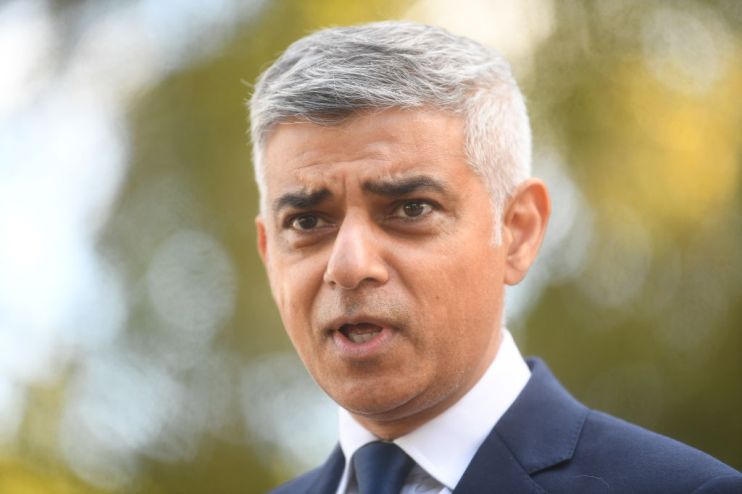Khan accuses PM of ‘blatant lie’ in tit-for-tat over TfL bailout

Sadiq Khan has accused the government of “lying” and playing “party political games” during Transport for London (TfL) bailout talks, sparking a tit-for-tat with the Prime Minister over the future of the ailing transport network.
The London mayor told TfL’s board meeting today that the government wrote a “blank cheque without conditions” when giving emergency funding to other transport companies, while London is “only being offered another six months financial support, but with ill advised and draconian conditions”.
“[The government’s proposed conditions] are unfair to London, fall disproportionately on those least able to afford them… and contrast starkly with the support provided with the private train operating companies,” he said.
Khan said last night he “cannot accept” conditions attached to Whitehall’s bailout, which he claims include an extension to the congestion charge, above-inflation fare hikes and a back-door increase to Londoners’ Council Tax bills.
Prime Minister Boris Johnson hit back at today’s PMQs, claiming the mayor “bankrupted TfL before coronavirus had even hit”, despite the lockdown causing a 95 per cent drop in fare revenues.
“Any expansion of the congestion charge or any other measure taken to improve the finances of TfL are entirely the responsibility of the bankrupt current mayor of London,” said the PM.
The comments sparked a sour tit-for-tat between the current mayor and his predecessor, with Khan accusing Johnson of telling a “blatant lie”.
“The PM has lied to the House of Commons,” Khan said on Twitter. “Before Covid I was fixing his mess at TfL — reducing the deficit by 71 per cent since 2016. Covid-19 is the sole cause of TfL’s challenges.”
It comes as central government and TfL have been locked in negotiations over a settlement to plug a multi-billion pound hole in the transport body’s finances, after lockdown regulations hammered revenues across the network.
The row, which hinges on the changes TfL would have to make in order to receive emergency funding, threatens the ability of the network to keep running.
On Tuesday evening, reports emerged that the Department for Transport (DfT) was considering seizing control of TfL from City Hall if it failed to accept the bailout conditions.
Read more: TfL could be seized by Government if funding impasse continues
Mayor’s demands
Khan has asked for just shy of £5bn to keep the network running for the next 18 months. A previous support package of £1.6bn signed in May to propel up TfL throughout lockdown is understood to have run dry.
The mayor has slammed the DfT’s demands to extend the congestion charge, hike TfL fares by more than one per cent above inflation and introduce a new Council Tax precept charge in the capital as too “punitive”.
The latter would be seen as particularly controversial as London boroughs already charge significantly above the national average.
“The government should be supporting Londoners through this difficult time — not making ill-advised and draconian proposals which will choke off our economic recovery,” the mayor said.
Business bodies blasted the government’s demands for a potential bailout as a “mockery” this afternoon, accusing ministers of “railroading” policy through while the transport network is on its knees during the pandemic.
London First, a business campaign group representing more than 200 companies in the City, said there was an “urgent need for the government to provide further short-term cash support” for TfL during the coronavirus crisis.
“Railroading these policies through as non-negotiable conditions attached to emergency support for an essential transport service used by millions of people daily is not the right way forward — and makes a mockery of the government’s commitment to devolution,” said chief executive Jasmine Whitbread.
Shadow transport secretary Jim McMahon told City A.M. it was “extremely worrying that despite repeated requests, the government is offering only a papering-over-the-cracks funding package for TfL, with such punitive conditions.”
“If the government gives financial support to the privately operated rail network, it is inconceivable that it does not do the same for publicly owned transport providers like TfL, which need long-term secure funding during what could be a lengthy period in which they won’t be able to operate at full capacity.”